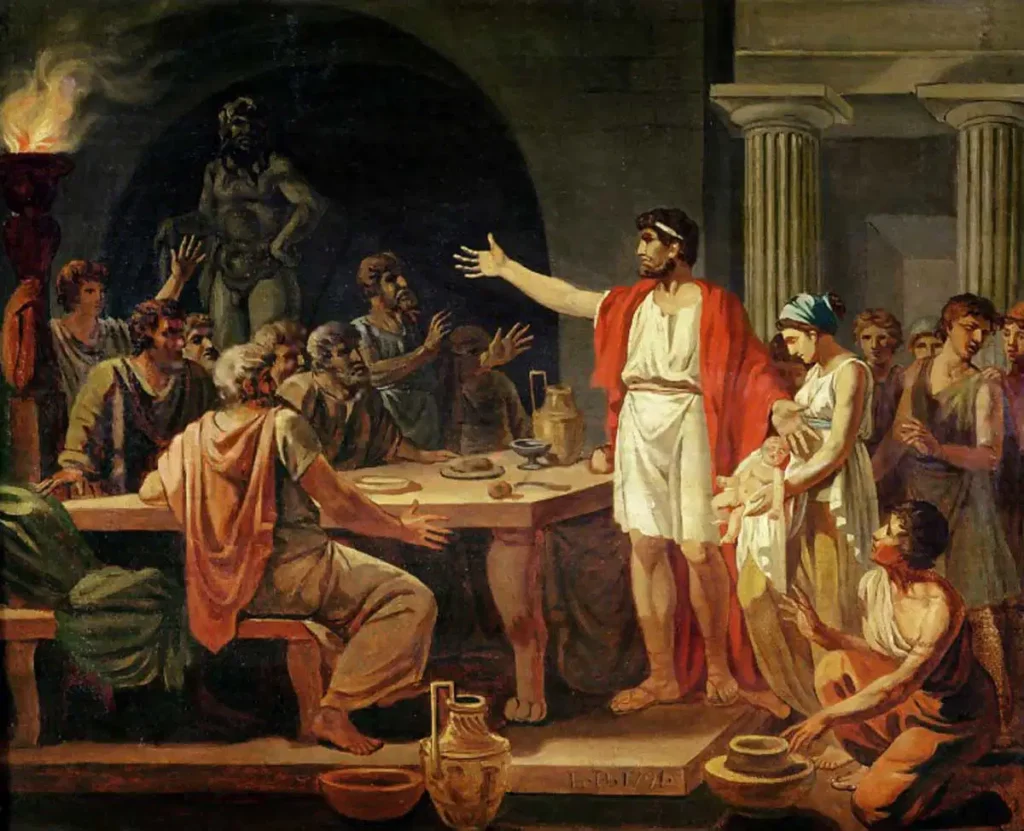The Government of Ancient Sparta

Ancient Sparta had a unique and highly structured system of governance that set it apart from other Greek city-states. The government of ancient Sparta was an oligarchy, meaning that power was concentrated in the hands of a few. However, it also incorporated elements of monarchy, democracy, and aristocracy, forming a mixed constitution that Aristotle later praised for its balance.
In this blog, we will explore the intricate political structure of the government of ancient Sparta and examine how its different governing bodies worked together to create a system that remained stable for centuries.
The Dual Kingship
Sparta is perhaps best known for its dual kingship, an unusual system in which two kings ruled simultaneously. These kings came from two separate royal dynasties—the Agiads and the Eurypontids—both of whom claimed descent from the mythical hero Herakles. Although equal in power, their roles and influence often varied.
The Agiad dynasty was considered the senior line, producing some of Sparta’s most renowned rulers, such as Leonidas Iand Cleomenes I. Agiad kings were traditionally more conservative, committed to upholding Sparta’s rigid traditions, and wielded considerable authority in military and political matters.
The Eurypontid dynasty, while junior in status, held equal royal authority. Some of its notable kings included Archidamus II and Agesipolis I. This lineage was historically more open to diplomatic negotiations and constitutional reform, particularly in Sparta’s later years.
To outsiders, this system of two simultaneous monarchs was perplexing, but it served as a fundamental check on power within Sparta. With each king balancing the other, no single ruler could dominate the state entirely.
The Ephors
One of the most powerful institutions in Spartan governance was the Ephorate. Each year, the Apella (the Spartan citizen assembly) elected five Ephors (Ἔφοροι, “overseers”) from the Spartiates—full Spartan citizens known as homoioi(ὅμοιοι, “equals”).
These officials wielded extraordinary power, serving as the executive authority that enforced laws, controlled foreign policy, and oversaw the daily administration of the state. Uniquely, the Ephors also had the authority to put kings on trial—a remarkable limitation on royal power unheard of in most contemporary states.
Each year, the kings and Ephors swore an oath: the kings vowed to govern justly, while the Ephors pledged to uphold Spartan law. If a king overstepped his authority, the Ephors had the power to remove him from his position.
One of the most striking examples of the Ephors’ influence was the downfall of King Pausanias, a celebrated Spartan general who led the Greeks to victory against the Persians at Plataea. Despite his military success, whispers of treason reached the Ephors—rumors that Pausanias had adopted Persian customs, mistreated allies, and even conspired with Xerxes himself to establish a tyranny over Greece.
Initially, Pausanias was acquitted due to a lack of concrete evidence. However, his suspicious behavior persisted, and the Ephors soon launched a secret investigation. When a captured messenger provided undeniable proof of Pausanias’ betrayal, the Ephors acted decisively. They moved to arrest him, but Pausanias fled to the Temple of Athena, seeking sanctuary. Unwilling to violate sacred ground, the Ephors instead barricaded him inside and starved him to death—dragging his dying body from the temple just before his last breath to avoid defiling the holy site.
This episode underscores the immense authority of the Ephors, proving that in Sparta, even kings were not above the law.
The Gerousia
The Gerousia was the Spartan Council of Elders, an elite legislative and judicial body. Composed of 28 men over the age of 60—plus the two kings—it wielded significant influence over Spartan policy.
These elders, known as gerontes, were elected by the Apella for life. Their age and experience were believed to grant them wisdom, and their role was to propose new laws, preside over trials, and act as the supreme court of the Spartan state. It was the Gerousia that determined the fate of figures like King Pausanias, ensuring that Spartan law was upheld at the highest level.
Deeply conservative, the Gerousia resisted change and remained committed to preserving Sparta’s rigid traditions and militaristic way of life. While other Greek states evolved politically, the Gerousia ensured that Sparta remained steadfast in its ancient customs.
The Apella
The Apella was the Spartan Citizen Assembly, composed of all male Spartan citizens over the age of 30. However, despite being the largest governing body, it paradoxically had the least power.
The Apella’s primary role was to vote on laws proposed by the Gerousia, elect the five Ephors, and make decisions regarding war and peace. However, unlike the Athenian assembly, the Apella did not engage in open debate or propose legislation.
Voting was done not by secret ballot, but by shouting—the side that produced the loudest response was considered the winner, with the Ephors ultimately determining the outcome. This crude method allowed Sparta’s ruling class to manipulate decisions, ensuring that policies aligned with the interests of the state’s elite. Furthermore, the Ephors could override or reinterpret votes, further limiting the Apella’s influence.
Conclusion
The government of ancient Sparta was a complex fusion of monarchy, oligarchy, and limited democracy, carefully structured to maintain stability and military dominance.
- The dual kingship provided leadership while preventing any single ruler from accumulating too much power.
- The Ephors enforced laws and had the authority to check even the kings.
- The Gerousia acted as a legislative and judicial body, ensuring adherence to Spartan tradition.
- The Apella allowed citizens a voice, albeit a restricted one, in state affairs.
This intricate balance enabled Sparta to endure for centuries as one of the most formidable powers of the ancient world. While its rigid and conservative nature ultimately contributed to its decline, the Spartan model remains a fascinating example of ancient governance—a system where discipline, hierarchy, and stability reigned supreme.
Even today, historians marvel at Sparta’s unyielding political order, a stark contrast to the shifting democracies and monarchies of its time. It was a city-state unlike any other—an empire without wealth, a power built on discipline, and a society engineered for war. If you’re interested in the government of ancient Sparta or similar topics, check out our blogs page for more.
